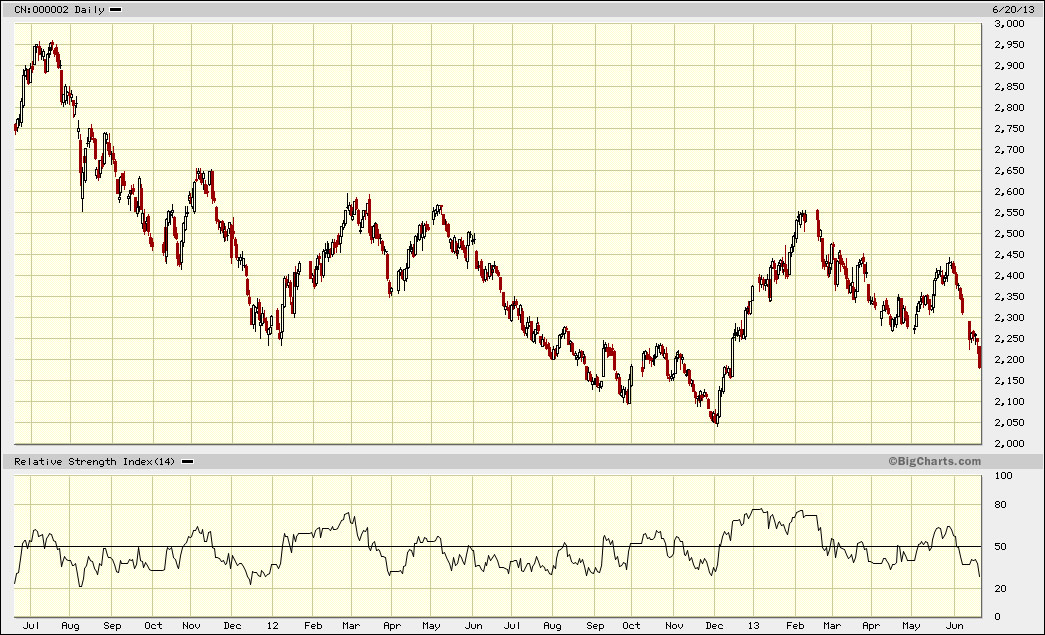Following the FOMC announcement (although there is probably no direct causal relationship, it is still noteworthy that this temporal coincidence occurred), interbank lending rates (SHIBOR) and repo rates in China went absolutely ballistic overnight. Allegedly a speech by prime minister Li Keqiang was responsible for the turmoil, but we actually have some doubts about that – although it can of course not be ruled out that it was a contributing factor.
“China’s benchmark money-market rates climbed to records as the central bank refrained from using reverse-repurchase agreements to address a cash crunch in the world’s second-biggest economy.
The People’s Bank of China didn’t conduct open-market operations to add or drain funds today and sold 2 billion yuan ($326 million) of three-month bills. Maturing notes added a net 28 billion yuan to the financial system this week, after increases totaling 252 billion in the last two weeks. Chinese banks need to step up efforts to support economic reforms and do more to contain financial risks, the central government said yesterday after a meeting led by Premier Li Keqiang.
The seven-day repurchase rate, which measures interbank funding availability, rose 270 basis points, or 2.70 percentage points, to 10.77 percent in Shanghai, according to a daily fixing announced by the National Interbank Funding Center. That was the highest in data going back to March 2003. The one-day rate rose by an unprecedented 527 basis points to an all-time high of 12.85 percent, a separate fixing showed. An intra-day gauge of the one-day rate touched a record 30 percent.
“The market’s move is not just because of liquidity but due to a policy stance that won’t change,” said Zhou Hao, a Shanghai-based economist at Australia & New Zealand Banking Group Ltd. “After Li’s statement yesterday, the market now sees the crunch lasting longer. Until after mid-July, liquidity won’t get better significantly.”
(Emphasis added)
Allow us to point out here that such a major crunch in the interbank lending market is surely not happening 'on purpose'. No central bank watches with equanimity when rates in the interbank lending market go absolutely haywire.
Here is an overview of SHIBOR rates from the overnight to the 6 month rate – this certainly looks like something is going seriously wrong in China's banking system:
SHIBOR goes haywire across the maturity spectrum, but the yield curve continues to be completely inverted - click image to enlarge.
As can be seen, the inversion of the yield curve is worsening, but more importantly, SHIBOR has now clearly broken out above the technical resistance level that was provided by previous spike highs.
In other words, this spike is of a different quality than previous ones. It indicates that trust between banks is eroding fast, and thereby tells us indirectly that the faux 1% NPL ratio reported by China's banks is indeed masking a far worse underlying reality. Our bet is that large upsets in China's 'shadow banking' are occurring, very likely one or several of the investment trust products used by the banks to circumvent government credit restrictions are about to blow up.
If so, then a major credit crisis is about to engulf China. This will have repercussions around the world.
A close-up view of the overnight SHIBOR rate – the previous all time high has been exceeded by a huge margin now - click image to enlarge.
Conclusion:
We believe that similar to emerging market bonds and currencies, China may now be a victim of a reversal of capital flows induced by the Bank of Japan's unprecedented stimulus measures and the associated collapse in the yen's exchange value. Such actions always reverberate around the world, and we know since the Asian crisis of 1997-1998 that whenever either the yen or the yuan or both are weakening sharply relative to other currencies in the region, upheaval soon follows. This time, China appears to be one of the main victims of these developments, as the yuan has remained firm during the yen's recent collapse.
There has been a vast credit bubble in China, with banks employing ever more dubious methods to expand credit further. Associated with this credit bubble was malinvestment of capital on a truly colossal scale. Now it appears the chickens may be finally coming home to roost.
The recent plunge in China's stock market has continued as well:
The Shanghai stock index keeps falling – click image to enlarge.
It will be interesting to see how the authorities react to these developments. It could well be that things are already out of their control.
Charts by: Shibor.orb, BigCharts
Source: Acting Man









